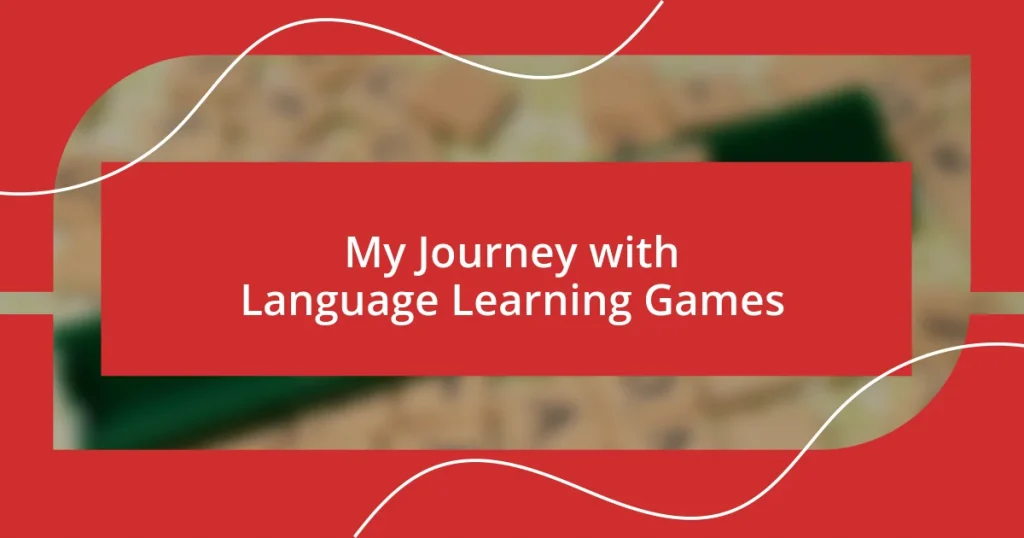Key takeaways:
- Language learning games enhance enjoyment and engagement by adapting to various learning styles and providing a low-pressure environment for exploration.
- Choosing the right games aligned with specific learning goals and incorporating elements like competition can significantly boost motivation and effectiveness.
- Sharing experiences and insights within a supportive community fosters growth and introduces diverse strategies, enhancing the overall language-learning journey.
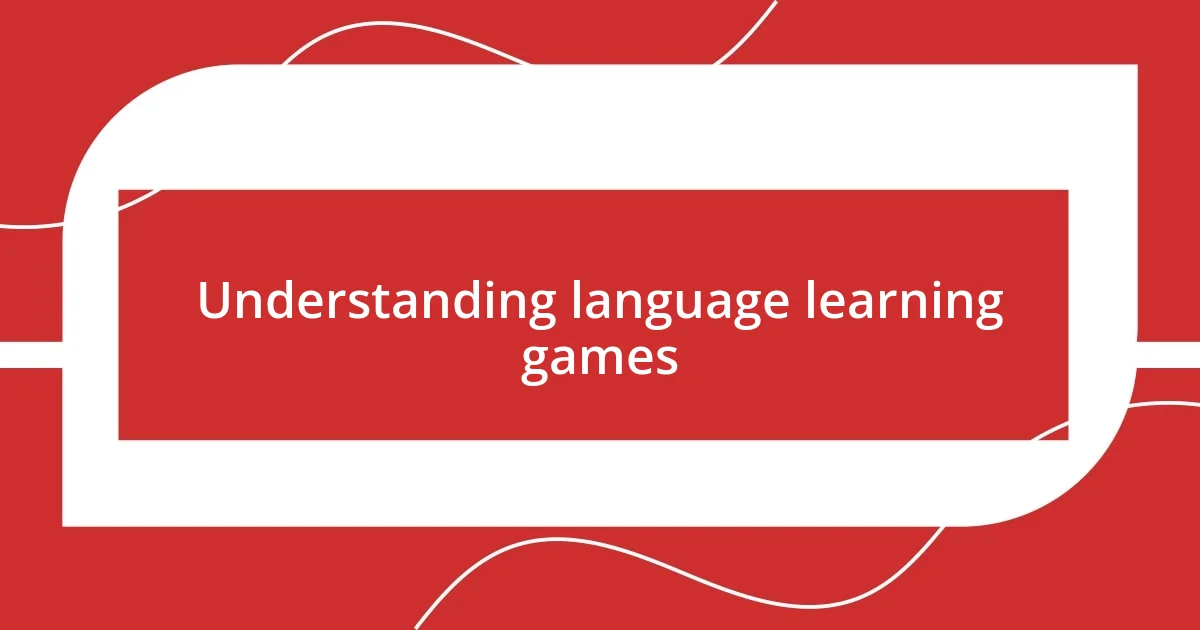
Understanding language learning games
Language learning games are innovative tools designed to make the process enjoyable and effective. I remember vividly the first time I played an app that turned grammar exercises into a competitive challenge; it felt less like studying and more like a quest. What a game-changer it is when you realize that learning can be playful!
One of the fascinating aspects of these games is their ability to adapt to various learning styles. For instance, I’ve noticed how visual learners, like my friend, thrive in games filled with colorful animations and interactive elements. Doesn’t it make you wonder how personalized experiences can enhance our understanding of a new language?
Moreover, language learning games often create a low-pressure environment, encouraging exploration without the fear of making mistakes. When I used a vocabulary-building game, I found myself trying out new words I would have hesitated to use in a formal setting. Isn’t it amazing how play can foster confidence and spark curiosity in language learning?
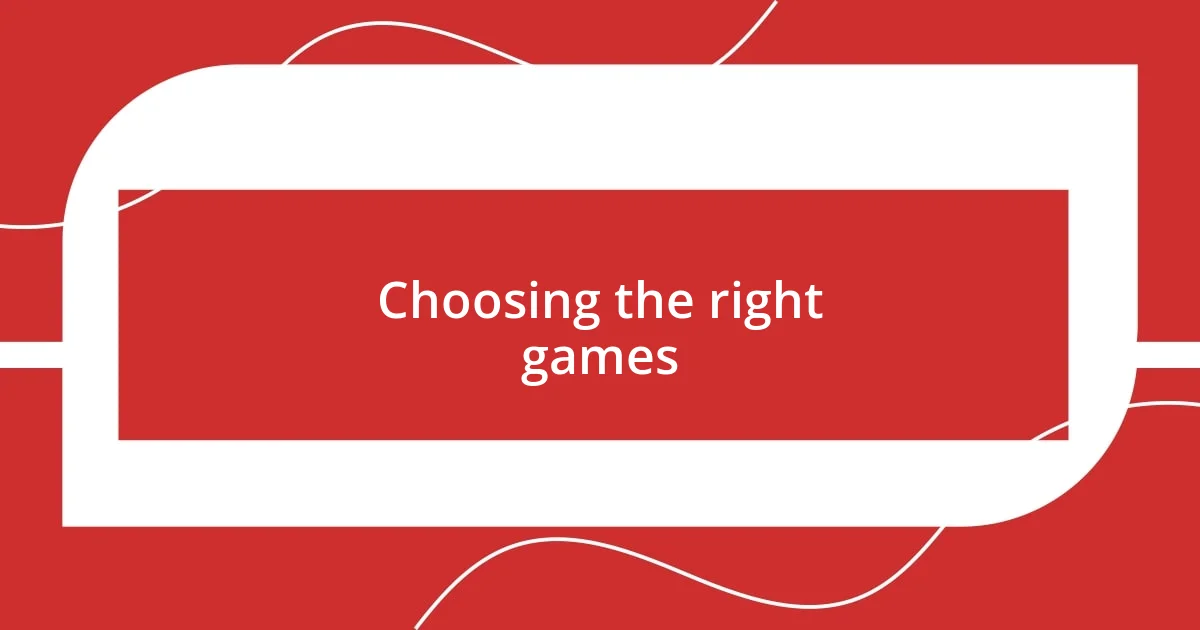
Choosing the right games
Choosing the right games is crucial for maximizing language learning benefits. I often look for games that align with my specific learning goals; for example, if I want to focus on speaking skills, I choose games that require verbal interaction. It’s fascinating how the right game can turn practice into an exhilarating experience, making me feel like I’m actually conversing in the language rather than just memorizing vocabulary.
When considering options, I compare factors like user experience, content depth, and adaptability to my skills. One evening, I stumbled upon a game that adjusted its difficulty based on my performance, and it felt like having a personalized tutor! I realized then that adaptability in games can significantly enhance engagement and effectiveness.
Ultimately, acknowledging my preferences is vital in the selection process. I noticed that I enjoy competitive elements, which encourages me to dive deeper into practice. Have you ever felt that rush of motivation when you’re trying to beat your own high score? That’s the kind of energy I seek in language learning games.
| Game Feature | Importance |
|---|---|
| User Experience | Improves engagement and enjoyment |
| Content Depth | Enhances vocabulary and grammar knowledge |
| Adaptability | Personalizes learning experience |
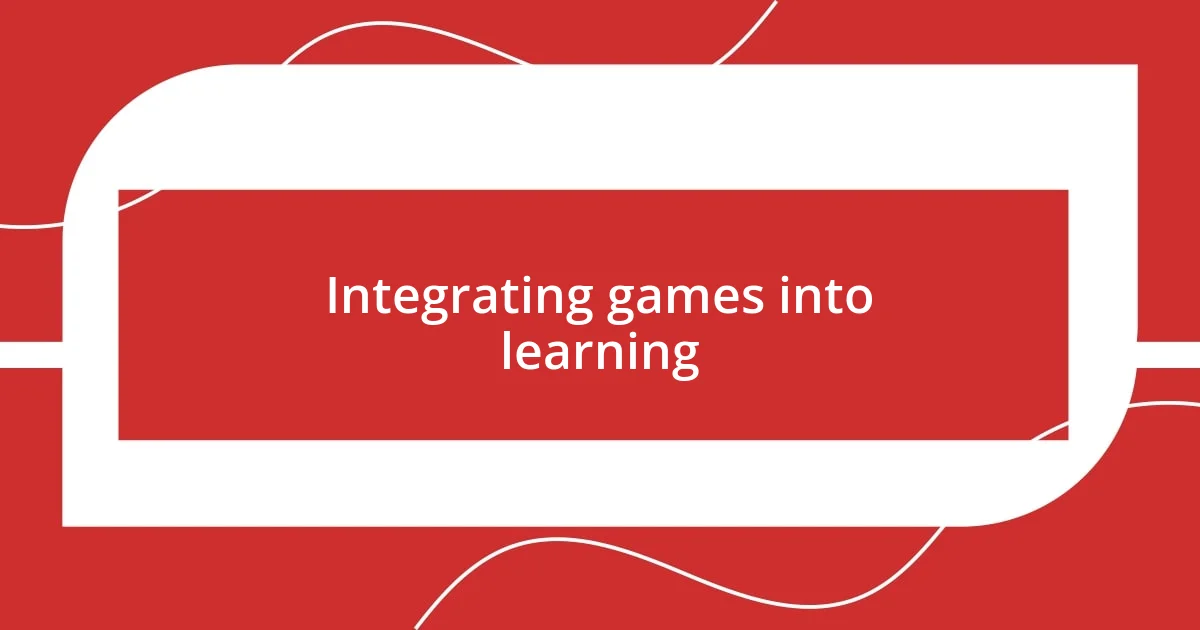
Integrating games into learning
Integrating games into everyday language learning can be a transformative experience. I remember the thrill when I first incorporated a multiplayer language game into my routine; it felt like joining a lively conversation with friends. These games don’t just add fun; they build a sense of community and camaraderie among learners, which, I believe, enhances motivation and commitment to language acquisition.
To get the most out of integrating games into learning, consider the following tips:
- Set specific goals: Define what you want to achieve through gaming, like improving vocabulary or conversation skills.
- Create a schedule: Designate regular times for gaming, making it a fun and consistent part of your study routine.
- Engage with others: Invite friends to join you, turning solo gaming into a social experience that promotes collective learning.
- Mix it up: Rotate through different types of games to keep the experience fresh and cater to various language skills.
- Reflect on your progress: After each session, take a moment to note what you learned or areas where you can improve, reinforcing the growth mindset.
I’ve found that sharing my gaming experiences with others also enriches the process; we often exchange strategies or funny blunders, which not only lightens the mood but also deepens understanding. Have you noticed how discussing your learning journey with others can spark new ideas and perspectives? It becomes more of a shared adventure!

Benefits of using games
Using games for language learning offers several compelling benefits that can transform your entire experience. One of my favorite aspects is the ability to learn through play, which naturally reduces anxiety. I recall a time when I was practicing pronunciation in a competitive game; not only did I feel the pressure, but I also enjoyed laughing at my mistakes, which made the process feel less daunting. Isn’t it amazing how fun can make learning feel effortless?
Another benefit is the immediate feedback that many games provide. I vividly remember the moment I mispronounced a word in a game, and the character immediately reacted—both embarrassing and hilarious! That instant correction helped me learn more effectively than traditional methods. Have you ever experienced that “aha!” moment when a game gives you a nudge in the right direction? It’s like having a friendly companion guiding your learning journey.
Lastly, games foster a sense of achievement that can be incredibly motivating. I still recall the joy I felt when I unlocked a new level after mastering a set of vocabulary. It gave me a palpable sense of progress that traditional studying often lacked. How gratifying is it to see tangible results from your efforts? That feeling keeps me coming back for more, igniting my passion for further learning.
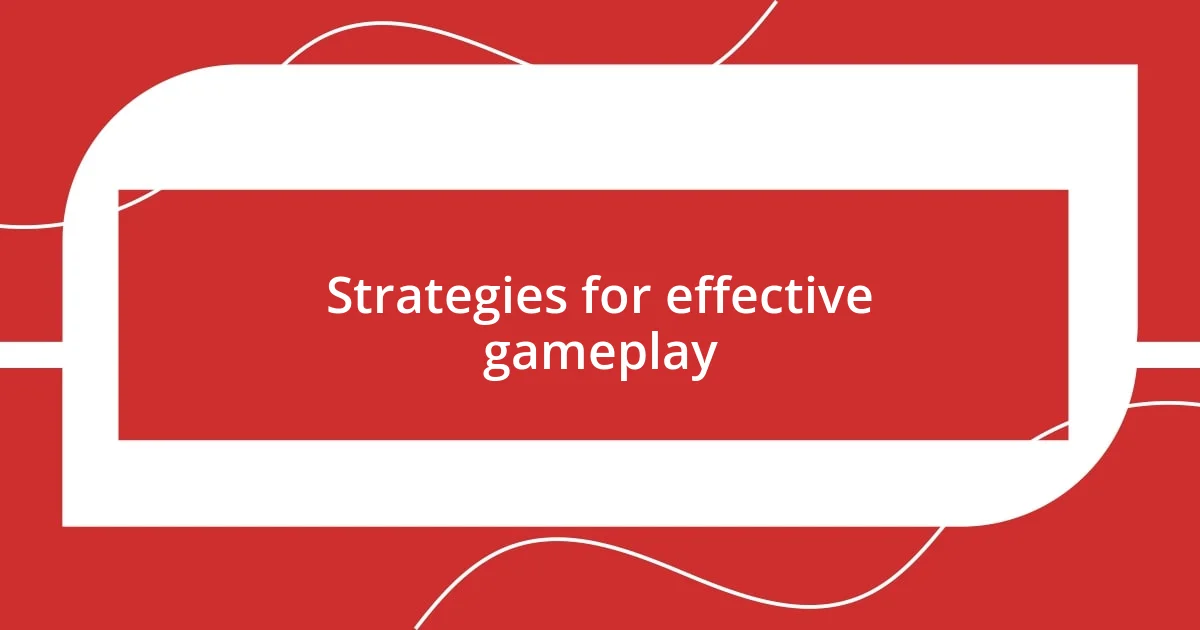
Strategies for effective gameplay
One effective strategy I’ve discovered is to embrace the concept of gamification in everyday study practices. For example, I often turn vocabulary review into a scoring game; I give myself points for every correct answer, and if I reach a certain threshold, I reward myself with a treat. This not only keeps my spirits high but also transforms mundane review sessions into something exciting. Have you tried adding playfulness to your routine? You might be surprised by how much more motivated you feel!
Another great approach is to leverage teamwork by playing games with friends or language partners. I remember the time I teamed up with a couple of peers for a language-rich trivia game. We weren’t just answering questions; we were helping each other with hints and explanations. Engaging with others in this way not only enhanced my understanding but also deepened our friendship. How often do you connect with others in your learning journey? When we collaborate, we share knowledge and support, creating a positive feedback loop that benefits everyone involved.
Lastly, I’ve found that self-reflection is crucial after gameplay. After my gaming sessions, I often take a few minutes to jot down my thoughts and lessons learned. One particular night after playing a challenging narrative game, I realized I had picked up several expressions I would’ve skipped in traditional study materials. It’s almost like having a personal coach who encourages you to evaluate your performance, helping you identify areas for growth. Have you considered taking that extra step to enhance your learning? Trust me; those reflections can lead to powerful insights that propel your language journey forward.
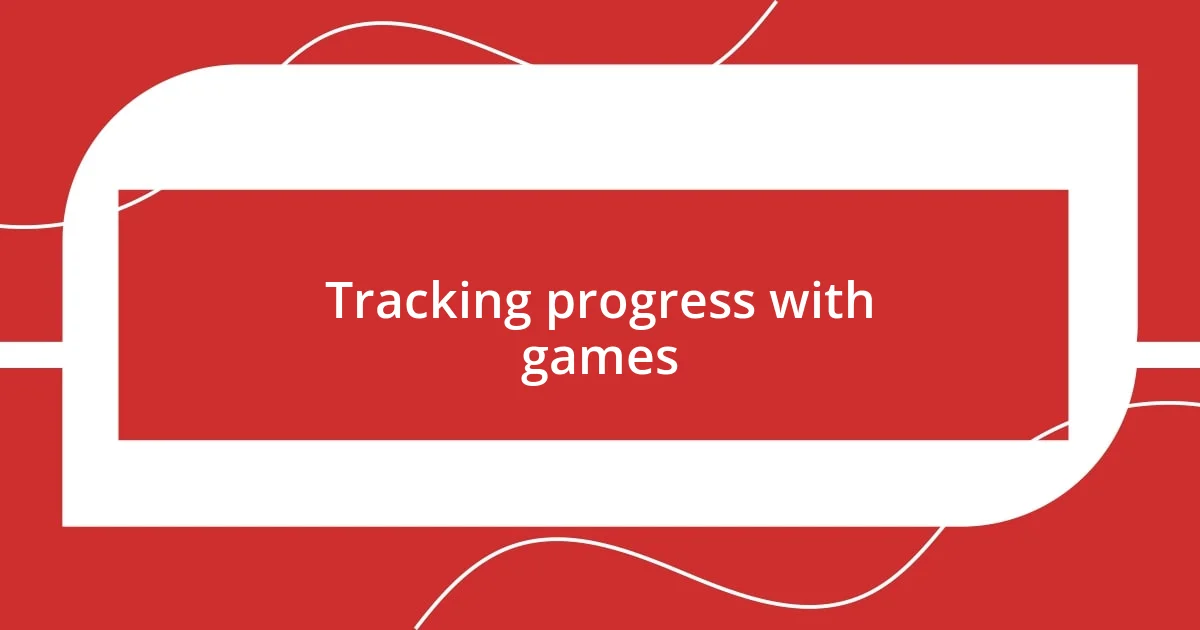
Tracking progress with games
Tracking progress with games can be an incredibly rewarding experience. I’ve noticed that many language-learning games come with built-in progress trackers that display metrics like accuracy rates, levels completed, and even streaks of daily practice. One time, I was delighted to see that I had formed a 30-day streak in a vocabulary game. This visual representation of my commitment made me feel accomplished. Have you ever found inspiration from a simple number on the screen? Sometimes, that little boost is all it takes to keep going.
Another aspect I appreciate is the way games often present challenges that evolve as your skills improve. For instance, when I first played a spelling game, I struggled with basic words. As I continued playing, I was delighted to progress to more complex vocabulary. Each new challenge felt like a mini-victory and kept me on my toes. Doesn’t it feel good when you notice your skills enhancing over time? It’s like leveling up in a video game—every achievement feels monumental.
Lastly, the social component of many language games also helps track progress. When I engaged in multiplayer settings, I could compare my accomplishments with friends. One memorable evening, my friend and I had a friendly competition, and the thrill of seeing my rank rise above theirs created a playful urgency. Have you ever felt that rush of excitement competing with someone? That friendly rivalry not only made the whole experience enjoyable but also highlighted how far I had come in my journey. The blend of progress tracking, evolving challenges, and social engagement truly enriches the language-learning process through games.

Sharing experiences and insights
Sharing experiences and insights can significantly enhance your language-learning journey. I recall a time I joined an online community focused on language games. The camaraderie among members was incredible! Not only did we share strategies, but we also celebrated each other’s milestones. These interactions made me realize that a supportive environment can supercharge motivation. Have you ever found inspiration in a community of learners?
One particular experience stands out to me: I participated in a language challenge where we had to use newly learned vocabulary in short stories. Crafting my story and sharing it with others felt intimidating yet thrilling. Feedback poured in, and I refined my language skills while engaging with fellow learners’ unique perspectives. It was a beautiful reminder of how sharing insights can foster growth. Do you share your learning experiences with others, and how has that shaped your journey?
Reflecting on these shared moments made me appreciate the diversity in our learning paths. The differences in our approaches opened my eyes to strategies I’d never considered. For instance, a peer mentioned using music-based games to boost listening skills—a technique I immediately tried out. It sparked a new level of enthusiasm in my learning! How often do you exchange ideas about language learning? Engaging with others can unlock new territories in our linguistic adventures.









